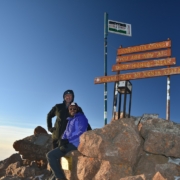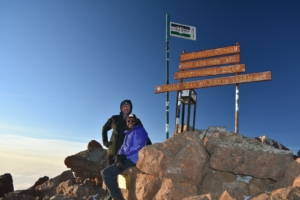Mount Kenya Hiking: Conquer Africa’s Second-Highest Peak(2024 Guide)
Mount Kenya Hiking vacations are just what the doctor ordered for the adventure Junkie. Embark on a challenging yet immensely rewarding journey to the rooftop of Kenya: Mount Kenya’s highest trekking peak, Point Lenana (4,985 meters). As you conquer the slopes, prepare to be awestruck by the panoramic vistas that unfold around you.
Imagine standing atop the world, with the wind whipping through your hair and the dramatic volcanic massif sprawling beneath your feet. Witness the majestic twin peaks of Batian and Nelion, piercing the sky like silent sentinels.
Gaze across the endless expanse of the Kenyan central plains, a verdant tapestry stretching as far as the eye can see. Feel the ancient pulse of the land beneath your boots, every step echoing through a landscape sculpted by time and glaciers.
Immerse yourself in the unique flora and fauna that call this mountain home. Marvel at the towering giant groundsels, their spiky silhouettes reaching for the sun. Spot the curious rock hyraxes, their furry forms clinging to the rocky outcrops.
PRO TIP: To truly appreciate the enchantment of Mount Kenya, we recommend conquering its peaks from all angles. Ascend and descend via different routes, savoring the diverse landscapes and challenges each path presents.
- Choose your adventure: Opt for the comfort of mountain huts or embrace the rustic charm of camping under a canopy of stars.
- Rest assured knowing you’re in good hands. Our experienced and well-trained guides possess intimate knowledge of every route and hold international first aid certifications. Their expertise will ensure your safety and enjoyment throughout the trek.
- Travel light and focus on the climb. If requested, our team provide all the essential camping and cooking equipment, while our dedicated porters will shoulder your belongings (up to 15kgs) so you can concentrate on conquering the peaks.
What permits and regulations are in place for hiking Mount Kenya, and how can they be obtained?
Hiking Mount Kenya requires obtaining a permit from the Kenya Wildlife Service (KWS). Permits can be obtained online through the KWS website or in person at the Mount Kenya National Park gates. It’s essential to check the current regulations and comply with conservation guidelines for a responsible hiking experience
Are guided tours available, and how can one choose a reputable tour operator for a Mount Kenya expedition?
We offer guided tours for this once in a life time experience. Please reach out to our team to learn more.
What level of physical fitness is required for a Mount Kenya hike, and are there training recommendations beforehand?
A moderate to high level of physical fitness is required for a Mount Kenya hike, especially for summit attempts. Hikers should engage in cardiovascular and strength training exercises to build endurance and stamina. Training at higher altitudes, if possible, can aid in acclimatization to the mountain’s elevation.
What equipment and gear are essential for a Mount Kenya hike, and can any be rented locally?
Essential gear for a Mount Kenya hike includes sturdy hiking boots, weather-appropriate clothing, a backpack, a sleeping bag, a tent, and a first aid kit. Depending on the chosen route and season, additional equipment like crampons and ice axes may be necessary for summit attempts. While some gear can be rented locally, it’s advisable to bring personal items for comfort and familiarity.
What wildlife and plant species can be encountered during a Mount Kenya hike, and are there specific seasons for optimal sightings?
Mount Kenya is home to diverse wildlife, including various species of monkeys, antelopes, and birds. Unique plant species such as giant lobelias and groundsels are also prominent. The best times for optimal wildlife sightings are during the dry seasons, from January to February and July to October.
What safety measures are in place for hikers on Mount Kenya, especially concerning altitude-related challenges?
Safety measures on Mount Kenya include proper acclimatization strategies, experienced guides, and well-marked trails. Hikers are advised to ascend gradually, stay hydrated, and recognize symptoms of altitude sickness. Tour operators often implement emergency evacuation plans, and hikers should communicate any health concerns to their guides promptly.


